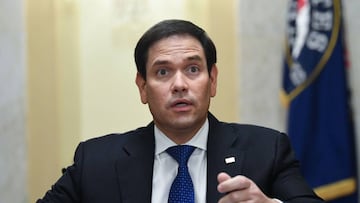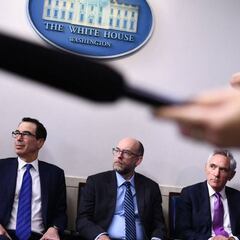Second stimulus check: could eligibility change?
Subsequent to President Donald Trump taking action by signing an executive order, Congress is working on who may qualify for a second stimulus check.

After Congress failed to reach an agreement on a new stimulus package to boost the American economy amid the Covid-19 pandemic by the deadline of 7 August, President Donald Trump, on Saturday, took unilateral action by signing a series of executive orders covering a range of subjects but that do not include a second round of stimulus checks.
Whether Trump wanted to or not, he was legally unable to provide for a second round of stimulus checks by way of executiver order, meaning it is now up to Congress to help millions of Americans struggling through the economic fallout of the Covid-19 pandemic by way of direct payments to individuals.
Trump approving stimulus checks would be unconstitutional
The President of the United States of America is not permitted to take money from the Treasury Department if this is not approved by Congress. It therefore now falls to the Senate (dominated by the Republicans) and the House of Representatives (dominated by the Democrats) to speed up the drafting and approval of a fourth and final stimulus relief package amid the outbreak. Both Republican and Democrat leaders have indicated this bill will include a second round of stimulus checks.
It is expected that the second round of payments will be worth up to $1,200 per individual just like the first round of stimulus checks, provided for by the CARES Act, which was signed into law back in late-March. Senate Majority Leader Mitch McConnell has been saying for the past few weeks that Congress wants to send another round of payments but Republicans and Democrats can’t come to an agreement on the overall size of the stimulus package, meaning talks stalled.
McConnell is unwilling to approve anything over $1 trillion at this point, while the Democrats are keen to preserve as much as they can of their $3 trillion HEROES Act that passed the House of Representatives, but was never called to the floor of the Senate by the Republicans.
- Second stimulus check: Senate leaves without coronavirus relief deal
- Stimulus check: Mnuchin says an agreement could happen this week
- $400 unemployment benefits: can I work and get the extra money?
- $400 employment benefit: how long will it last?
- $400 unemployment benefits boost: why has Trump taken executive action?
Who would qualify for the second round of checks
As Congress is drafting the stimulus relief package that will include a second stimulus check, they are also working on who qualifies. Republican Angie Caird sent out a reminder during the House Committee on Small Businesses hearing over who was left out in the CARES Act wit some lawmakers hoping to change some of the eligibility terms of the checks, although the income amounts are very unlikely to be increased.
Congress is working on including tax paying immigrants, college students, Americans married to non-citizens and low-income college students for the second round of stimulus checks worth up to $1,200 per individual.
No hard-working American should struggle to care for their family. Full stop.
— House Democrats (@HouseDemocrats) August 10, 2020
House Democrats passed the #HeroesAct to support families in need during the COVID-19 pandemic--but @SenateGOP continues to play politics.https://t.co/fMvW9WaLrh
Who was eligible for the CARES Act stimulus checks?
Under the terms of the CARES Act, $1,200 checks have been sent to individuals who earn less than $75,000 a year, while joint tax filers on a combined annual income of under $150,000 have received $2,400. Checks for a steadily smaller amount have also been made available to higher earners, up to a final cap of $99,000 for individuals and $198,000 for joint filers.
In addition, households have been able to claim an extra $500 per dependent under the age of 17.
Who would be eligible for the next round of checks?
By comparing the eligibility requirements of the CARES Act stimulus checks with the conditions set out by Republicans in the HEALS Act and by the Democrats in the HEROES Act - a $3tn proposed stimulus bill that also contained provision for a second check, but was not taken up by GOP senators - the chief conclusion that can be drawn is that the parameters of the next payment will in fact be largely unchanged.
Negotiations over a stimulus bill capable of passing both the Democrat-held House and the Republican-led Senate may have stalled, but this is as much a result of other issues, such as the extension of expanded unemployment benefits, which have now been dealt with (in principle at least) by Trump's executive orders. When it comes to stimulus checks, there appears to be a relatively high degree of bipartisan consensus, as the terms of the CARES, HEROES and HEALS checks are all very similar. The only problem is the timetable for actually getting a proposal through and into law.
Income thresholds, credits for dependents
The HEROES Act mirrored the CARES Act by again seeking to give out stimulus checks for $1,200 and $2,400 to individuals on less than $75,000 and joint filers on $150,000, respectively, with the payments phased out up to upper income limits of $99,000 and $198,000. Meanwhile, GOP senators' HEALS Act also agrees that these should be the earnings caps on a second check.
Where a look at the Democrat and Republican stimulus-check proposals also offers fairly clear conclusions over the likely eligibility requirements is the issue of credits for dependents. While the CARES Act sent out an additional $500 only for children below 17, this age limit is absent from both the HEROES Act and the HEALS Act, with all dependents included in the two bills.
According to the Tax Foundation, the removal of the CARES Act age cap would see at least 26 million more people in the U.S. become eligible for the dependents' credit.
Democrats sought $1,200 per dependent
Related stories
However, one bone of contention could potentially be the amount paid per dependent: while Democrats sought to increase it to $1,200 in the HEROES Act (a sum claimable for a maximum of three dependents), the HEALS Act proposes maintaining the $500 CARES Act figure.
The HEROES Act and the HEALS Act also differ on whether or not to include immigrants without a Social Security number, who were left out of the CARES Act checks. Whereas HEROES vowed not only to bring them into the fold but also make them retroactively eligible for the CARES payments, the HEALS Act once more excludes them.

